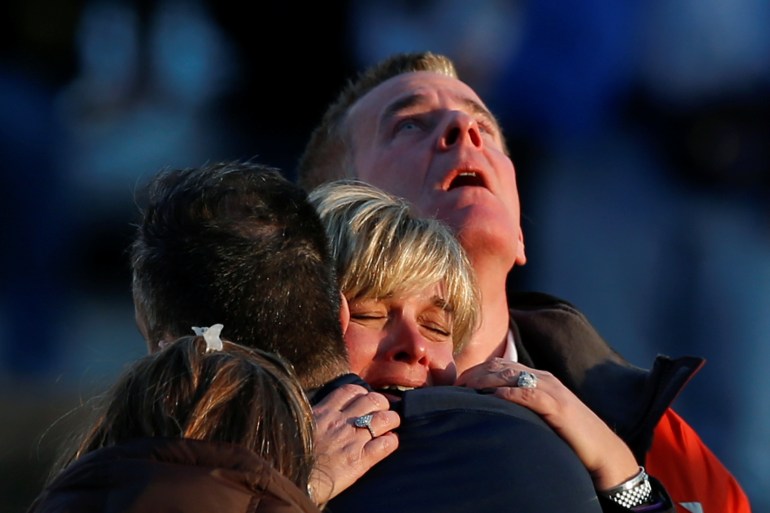Sandy Hook families reach $73m settlement with gunmaker | Gun Violence News
The families of nine victims of a 2012 mass shooting at Sandy Hook Elementary School in Connecticut have agreed to settle a lawsuit against the manufacturer of an AR-15 semi-automatic rifle used to massacre 20 six- and seven-year-old students and six educators.
Remington will pay $73m to settle the claims of the families who had sued in 2015 saying the company should have never sold such a dangerous weapon to the public. Their focus, the plaintiffs said, was on preventing future mass shootings.
Remington agreed in the settlement to allow the families to release thousands of documents they obtained during the lawsuit, including ones showing how it marketed the weapon.
“This case was never about damages in the sense of compensation. It was about damages in the sense of forcing change,” Josh Koskoff, a lawyer for the families said at a media conference announcing the settlement on Tuesday.
“It’s money that gets their attention,” Koskoff said, calling on gunmakers to take more responsibility for how their products are used.
The civil court case in Connecticut focused on how the Bushmaster AR-15 rifle used by the Newtown attacker was marketed to younger, at-risk males, including through product placement in violent video games. In one of Remington’s ads, it features the rifle against a plain backdrop and the phrase: “Consider Your Man Card Reissued”.
Sandy Hook was the fourth deadliest mass shooting in US history. It is part of an epidemic of gun violence and suicides in the United States that claimed nearly 45,000 lives in 2021, according to the Gun Violence Archive, which tracks the data.
Nicole Hockley, the co-founder and CEO of Sandy Hook Promise Foundation, lost her six-year-old son Dylan in the tragedy.
“Nothing will bring Dylan back,” Hockley said on Tuesday. “The closest I get to him now is by kissing his urn every night, telling him I love him and miss him. But I made him a promise and I’ll keep working to deliver that promise for the rest of my life.”
“My hope for this lawsuit is that by facing and finally being penalised for the impact of their work, gun companies along with the insurance and asking industries that enable them, will be forced to make their practices safer than they’ve ever been,” she said.
Remington, which filed for bankruptcy twice during the lawsuit, had argued there was no evidence showing its marketing had anything to do with the shooting. Initially, the company’s lawyers had claimed the lawsuit should have been dismissed because of a federal law that gives broad immunity to the gun industry.
But the Connecticut Supreme Court ruled Remington could be sued under state law over how it marketed the rifle. The gunmaker appealed to the US Supreme Court, which declined to hear the case. In July 2021, Remington had offered nearly $33m to settle the lawsuit.
 Children and parents leave Sandy Hook Elementary School after a 20-year-old gunman with mental health troubles killed 20 first-graders and six educators at the school in 2012 [Ted Shaffrey/AP Photo]
Children and parents leave Sandy Hook Elementary School after a 20-year-old gunman with mental health troubles killed 20 first-graders and six educators at the school in 2012 [Ted Shaffrey/AP Photo]The case was watched by gun control advocates, gun rights supporters and gun manufacturers across the country because it may provide a road map for victims of other mass shootings to sue the makers of firearms under state laws instead of federal law.
“The immunity protecting the gun industry is not bulletproof,” Koskoff said, adding that the settlement “shattered” the perception that gunmakers are shielded from liability.
Remington, one of the US’s oldest gunmakers founded in 1816, filed a second time for bankruptcy in 2020 and its assets were sold off. The manufacturer was weighed down by lawsuits and sales restrictions following the Sandy Hook shooting.
Lawyers for the families had argued Remington was using bankruptcy to avoid financial liability for the Sandy Hook shooting.
 Lynn and Christopher McDonnell, the parents of seven-year-old Grace McDonnell, grieve near Sandy Hook Elementary after learning their daughter was one of the 20 children and six adults killed after a gunman opened fire inside the school in 2012 [File: Adrees Latif/Reuters]
Lynn and Christopher McDonnell, the parents of seven-year-old Grace McDonnell, grieve near Sandy Hook Elementary after learning their daughter was one of the 20 children and six adults killed after a gunman opened fire inside the school in 2012 [File: Adrees Latif/Reuters]Adam Lanza, the 20-year-old gunman, used a rifle made by Remington and legally owned by his mother to kill the children and educators on December 14, 2012.
After killing his mother at their Newtown home, Lanza took the rifle to the school where he fired 154 rounds in five minutes before using a handgun to kill himself as police arrived.
Lanza’s mental health problems, his preoccupation with violence and access to his mother’s weapons had “proved a recipe for mass murder”, according to Connecticut’s child advocate.

